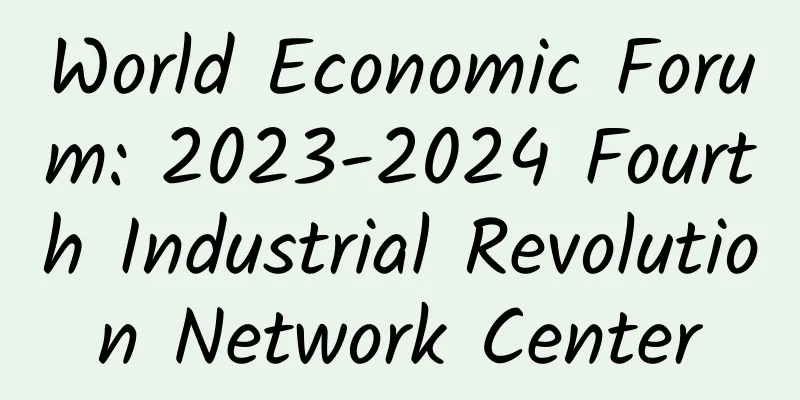World Economic Forum: 2023-2024 Fourth Industrial Revolution Network Center

|
The World Economic Forum has released its report “The Center for the Fourth Industrial Revolution Network 2023-2024”. The mission of the Center for the Fourth Industrial Revolution remains simple: to use rapidly developing technologies to improve lives around the world. Technology is inherently social in how it connects, serves and feeds people. It can help solve today’s biggest challenges and unlock endless opportunities. The Center for the Fourth Industrial Revolution Network is based on the recognition that different regions have different priorities for leveraging technology to address key challenges. This year there are seven core themes for research and impact on the industry: ushering in the intelligent era; transforming agriculture and food systems; revolutionizing health and biotechnology; accelerating the energy transition and sustainability; innovating mobility for autonomous systems; upskilling the workforce; stimulating investment and improving competitiveness; and promoting partnerships and communities. The adoption of artificial intelligence (AI) and automation has skyrocketed, completely changing priorities around the world and ushering in the so-called Intelligent Era, where AI and advanced automation are ubiquitous in technology and a growing number of applications. As many regions face global food security issues, the centers hope to address this challenge by applying technology in traditional agriculture and enhancing the alternative protein industry through overall innovation of food systems. Global health and health education remain cornerstone sectors of society, and centers are seeking to expand knowledge and access to health information and education. This includes enabling state or country-wide sharing of health research data, improving resources for health care workers, and access to education to advance health innovation. The future of energy is intertwined with the future of sustainability, and many are looking to leverage key technologies to improve energy efficiency and increase the availability of data in pursuit of a sustainable future. Innovations in the movement of people and goods are increasing efficiency and reducing gaps caused by inequality and geography. Through drones and autonomous driving systems, these centers are trying to change the way people think about mobility. Ensuring that the workforce and society advance in technology at the same pace is key to future economic growth and creating a smart economy. Upskilling programs and pilots are key to modernizing education and keeping workers active in key industries. The future of the economy is up for grabs, and cutting-edge technologies are always on the verge of disrupting conventional wisdom. Through investments in digital assets, quantum and space technologies, and an improved regulatory environment, the economic future has endless possibilities. These innovations and impacts would not be possible without collaboration. The Network aims to expand the possibilities for innovative solutions through pilot projects, in-person and virtual events, and by building partnerships between hubs, bringing together regional stakeholders to collaborate and create impact.
|
<<: Not only Google's own mobile phones, these old phones can also be upgraded to the latest system
Recommend
How to guide users to create content from 0 to 1?
1. What did Lukou Community do from 0 to 1? Lukou...
What should we pay attention to when developing and registering mini programs?
For individual developers 1. Make page navigation...
What can a public account do well in the early stages to accelerate user growth?
First of all, I want to say that the essence of b...
The capital winter is just a superficial phenomenon. The entrepreneurial logic behind Haier U+ Maker Competition
With the rapid development of China's economy...
What is the difference between TikTok Express and TikTok?
If you want to open Douyin Express Edition and Do...
WeChat mini program community group buying platform ranking, how to create a community group buying mini program?
WeChat mini program community group buying platfo...
iPhone 12's 5G will launch with two technologies, the latter of which may not be popular
According to the latest news, Apple's upcomin...
Product Operation: How to use data to create a good MVP?
The implementation of MVP is inseparable from dat...
Event promotion method: 4 steps to design an event to attract new customers using old customers!
Nowadays, it is becoming more and more expensive ...
The May Day holiday will be adjusted to 5 days! What is the specific reason for the 5-day May Day holiday? Attached is the holiday schedule for May Day 2022!
The May Day is just over half a month away. Accord...
Is the weight you lose when you are sick actually a form of immune “protection”?
In addition to weight loss Getting sick may also ...
Native advertising has deep routines. How can case-based copywriting make information flow advertising more outstanding?
You must have seen headlines like this: "Oh ...
After wading through water after rain, beware of these skin diseases
After heavy rain, prevent infectious diseases, es...
It is said online that watching horror movies can help you lose weight, but I advise you to be cautious!!
I saw a short video some time ago: watching horro...
iOS 16 is here, see you tomorrow
Tonight, or to be exact, tomorrow morning, this y...









